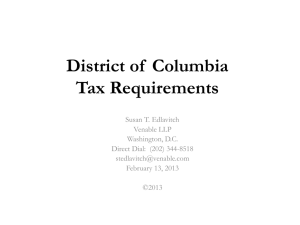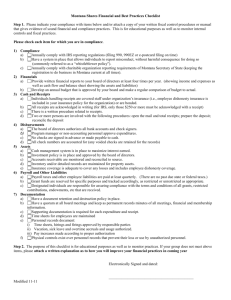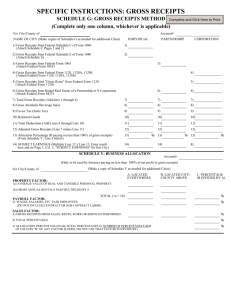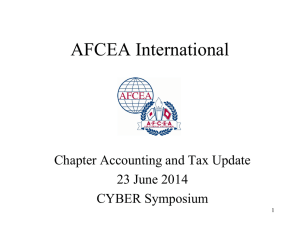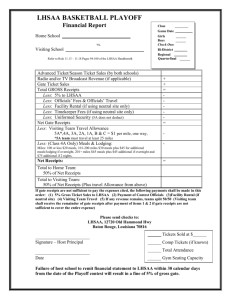- Bureau of Local Government Finance
advertisement
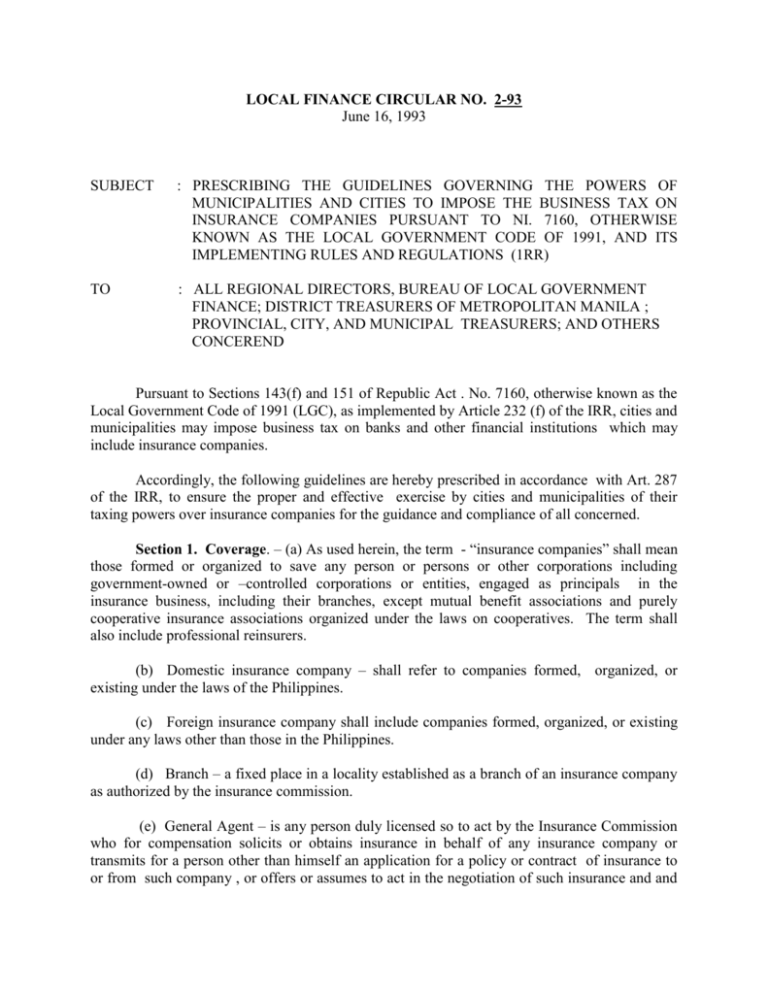
LOCAL FINANCE CIRCULAR NO. 2-93 June 16, 1993 SUBJECT : PRESCRIBING THE GUIDELINES GOVERNING THE POWERS OF MUNICIPALITIES AND CITIES TO IMPOSE THE BUSINESS TAX ON INSURANCE COMPANIES PURSUANT TO NI. 7160, OTHERWISE KNOWN AS THE LOCAL GOVERNMENT CODE OF 1991, AND ITS IMPLEMENTING RULES AND REGULATIONS (1RR) TO : ALL REGIONAL DIRECTORS, BUREAU OF LOCAL GOVERNMENT FINANCE; DISTRICT TREASURERS OF METROPOLITAN MANILA ; PROVINCIAL, CITY, AND MUNICIPAL TREASURERS; AND OTHERS CONCEREND Pursuant to Sections 143(f) and 151 of Republic Act . No. 7160, otherwise known as the Local Government Code of 1991 (LGC), as implemented by Article 232 (f) of the IRR, cities and municipalities may impose business tax on banks and other financial institutions which may include insurance companies. Accordingly, the following guidelines are hereby prescribed in accordance with Art. 287 of the IRR, to ensure the proper and effective exercise by cities and municipalities of their taxing powers over insurance companies for the guidance and compliance of all concerned. Section 1. Coverage. – (a) As used herein, the term - “insurance companies” shall mean those formed or organized to save any person or persons or other corporations including government-owned or –controlled corporations or entities, engaged as principals in the insurance business, including their branches, except mutual benefit associations and purely cooperative insurance associations organized under the laws on cooperatives. The term shall also include professional reinsurers. (b) Domestic insurance company – shall refer to companies formed, organized, or existing under the laws of the Philippines. (c) Foreign insurance company shall include companies formed, organized, or existing under any laws other than those in the Philippines. (d) Branch – a fixed place in a locality established as a branch of an insurance company as authorized by the insurance commission. (e) General Agent – is any person duly licensed so to act by the Insurance Commission who for compensation solicits or obtains insurance in behalf of any insurance company or transmits for a person other than himself an application for a policy or contract of insurance to or from such company , or offers or assumes to act in the negotiation of such insurance and and empowered by such company to do such other acts and things for and on its behalf in the conduct of its business as specified in the general agency agreement executed by and between them. In property and liability insurance, a general agent can bind a risk and thereby make insurance effective immediately and prior to the actual delivery of the policy; a limited agent has restricted powers and must operate within the scope of the authority delegated to him. (f) Head Office – shall refer to the principal office of the insurance company appearing in its articles of incorporation. (g) Insurance Policy – is a written instrument in which a contract of insurance is set forth. For purposes of this Circular, insurance policies shall be classified as follows: (1) Life insurance policies which may be – (i) ( ii ) ( iii ) ( iv ) Individual Life Group Life Industrial life Health, accident and disability insurance (2) Non-life insurance contracts which may be – ( i ) Marine ( ii ) Fire ( iii ) Casualty ( 3) Contracts of suretyship or bonding (h) Insurance Premium – is the agreed price for assuming and carrying the risk, i.e., the consideration paid to an insurer for undertaking to identify the insured against a specified peril, as indicated in the insurance contract. (i) Insurance Agent – any person who for compensation solicits or obtains insurance in behalf of any insurance company or transmits for a person other than himself or application for a policy or contract of insurance to or from (j) Insurance Broker – any person who for any compensation, commission or other thing of value acts or aids in any manner in soliciting, negotiating or procuring the making of any insurance contract or in placing risk or taking out insurance , on behalf of the insured other than himself. Section 2 . Tax on the Gross receipts of Insurance Corporations. – (a) The tax on insurance companies my be levied on their gross receipts for the preceding calendar year as follows: (1) By municipalities, at a rate not exceeding fifty percent (50%) of one percent (1%) of the gross receipts for the preceding calendar year; and (2) By all cities and municipalities within the Metropolitan Manila area , at a rate not exceeding seventy five percent (75%) of one percent (1%) of the gross receipts for the preceding calendar year. (b) For this purpose, “gross receipts” shall include only the following: (1) Insurance premiums actually collected , except the following: (i) (ii) (iii) (iv) (v) (vi) (vii) (viii) Premiums collected on insurance policies issued before the effectivity of the ordinance enacted by the city or municipality imposing the tax Two percent (2%) of all premiums for the sake of fire , earthquake, and explosion hazard insurance pursuant to P.D. 1185, otherwise known as Fire Code of the Philippines; Premiums refunded within six (6) months after payment of account; Reinsurance premiums by a company that has already paid the tax; Premiums collected or received by any branch of a domestic corporation, firm, or association doing business outside the Philippines on account of any life insurance of the insured who is non-resident. Premiums collected or received on account of any reinsurance, if the risk insured against covers property located outside the Philippines, or the insured , in case of personal insurance, resides outside the foreign country where the original insurance has been issued or perfected; Portions of the premiums collected or received by insurance companies pertaining o variable constraints; and The excess of the amounts necessary to insure the lives of variables contracts. However, the aforementioned tax-exempt premiums shall be recorded and declared separately. (2) Interest earnings on loans and discounts actually collected. (3) Rentals actually collected from property owned by insurance companies. (4) Income actually collected from acquired assets. (5) Cash dividends received on equity investments. (c) As used herein, “gross receipts” shall not include the following: (1) All other income and receipts not otherwise enumerated in the preceding guidelines shall be excluded from the taxing authority of the city or municipality concerned. (2) Service fees received from fire, earthquake, and explosion re-insurance adjustment business directly to agents, pursuant to P. D. No. 1185, otherwise known as the Fire Code of the Philippines. (d) At the time of the annual payment of the tax due, the Head Office or branch of an insurance company, shall submit to the LGU concerned, a breakdown of the declared gross receipts for the preceding calendar year. (e) Commissions and other means of earnings of insurance agents and service representatives and insurance brokers shall not be taxable; however, these persons may be levied an occupation fee pursuant to Sec, 147 of the LGC; (f) The gross receipts of insurance, brokers may, however, be levied the tax on contractors and/or independent contractors, pursuant to Sec. 143 (e) of the LGC. Section 3. Non-separability of Insurance Business. – Activities which are inherent, related, necessary or incidental to the insurance business shall treated as one business activity subject to the same tax rate under section 2 (a) hereof. The amount of tax thereon shall be computed on the basis of the combined gross receipts of all said insurance activities. In view hereof, the provisions of Art. 242 of the IRR requiring a person or entity to get a separate mayors permit for each activity shall not apply to the insurance activities, as defined above. Section 4. Procedures for the Enactment of Tax Ordinances. – (a) The tax on insurance companies as provided herein may be imposed by a city or municipality only through an appropriate ordinance enacted by the Sangguniang Panlungsod or Sangguniang Bayan, as the case may be. Such ordinance shall be enacted and approved in accordance with Arts. 107, 108, 276 of the IRR. (b) Pursuant to the procedures on the conduct of public hearings as prescribed in the Art. 276 (b) of the IRR, the Sanggunians concerned shall cause the sending of written notices of public hearings for proposed ordinances to the branch manager or the highest officer of the Head Office of affected insurance companies within their territorial jurisdictions. (c) Any tax ordinance which does not comply with the above provisions shall be deemed null and void. Enforcement of such ordinance shall be a ground for disciplinary action against the officials or employees responsible therefore as provided in Art. 280 of the IRR. Section 5. Situs of the Tax. – For purposes of collection of the tax, the following shall apply – (a) Insurance contracts/policies issued by the Head Office or branch shall be recorded in said office or branch as the case may be and the premiums and/or gross receipts due on such contracts/policies shall be taxable by the city or municipality where such Head Office or branch to which such premiums or gross receipts were actually paid is located. This rule shall be applied irrespective of whether the insurance contracts/policies were solicited or negotiated by insurance agents, or brokers who are not residents of the city or municipality where the branch is located or affiliated with or assigned to such branch: (b) The offices of an insurance agent, or broker, shall not be considered a branch and shall not be subject to the situs of taxation rule. (c) All insurance premiums and/or gross receipts from transactions not recorded in the branches of the insurance companies in accordance with paragraph (a) above shall be recorded in the Head Office and taxable by the city or municipality where said Head Office is located. (d) In case there is a transfer or relocation of the Head Office or of any branch to another city or municipality, the insurance companies shall give due notice of such transfer or relocation to the chief executives of the cities or municipalities concerned within fifteen (15) days after such transfer or relocation is effected. Section 6. Time of Payment. – The tax on insurance companies accruing to the LGUs shall be paid within the first twenty (20) days of January or of each subsequent quarter, as the case may be, unless otherwise fixed in the corresponding local tax ordinance. Section 7. Examination of Books of Accounts and Pertinent Records. – (a) The treasurer of the LGU concerned or through any of his deputies duly authorized in writing may examine the books of accounts and other pertinent records of insurance companies in order to ascertain, assess, and collect the correct amount of the tax due. (b) The examination shall be made during regular office hours not oftener than once a year for every tax period, which shall be the year immediately preceding the examination and shall be limited to verifying the summary of transactions submitted by the Head Office or branch of the insurance companies being audited, upon which the declaration of gross receipts for the preceding calendar year has been based and the tax paid thereon. Such certification shall be made of record in the books of accounts of the insurance company examined. Section 8. Repealing Clause. – All rules, regulations, orders, and/or circulars which are contrary to, or inconsistent with, the provisions of this Circular are hereby repealed or modified accordingly. Section 9. Effectivity. – This Circular shall take effect immediately. The regional Directors of the Bureau of Local government finance and District Treasurers of Metropolitan Manila Area are hereby instructed to disseminate the contents of this Circular to all Provincial, City and Municipal Treasurers within their respective jurisdictions for their information and guidance. (Original Signed) ROMEO L. BERNARDO Undersecretary of Finance Officer-in-Charge
